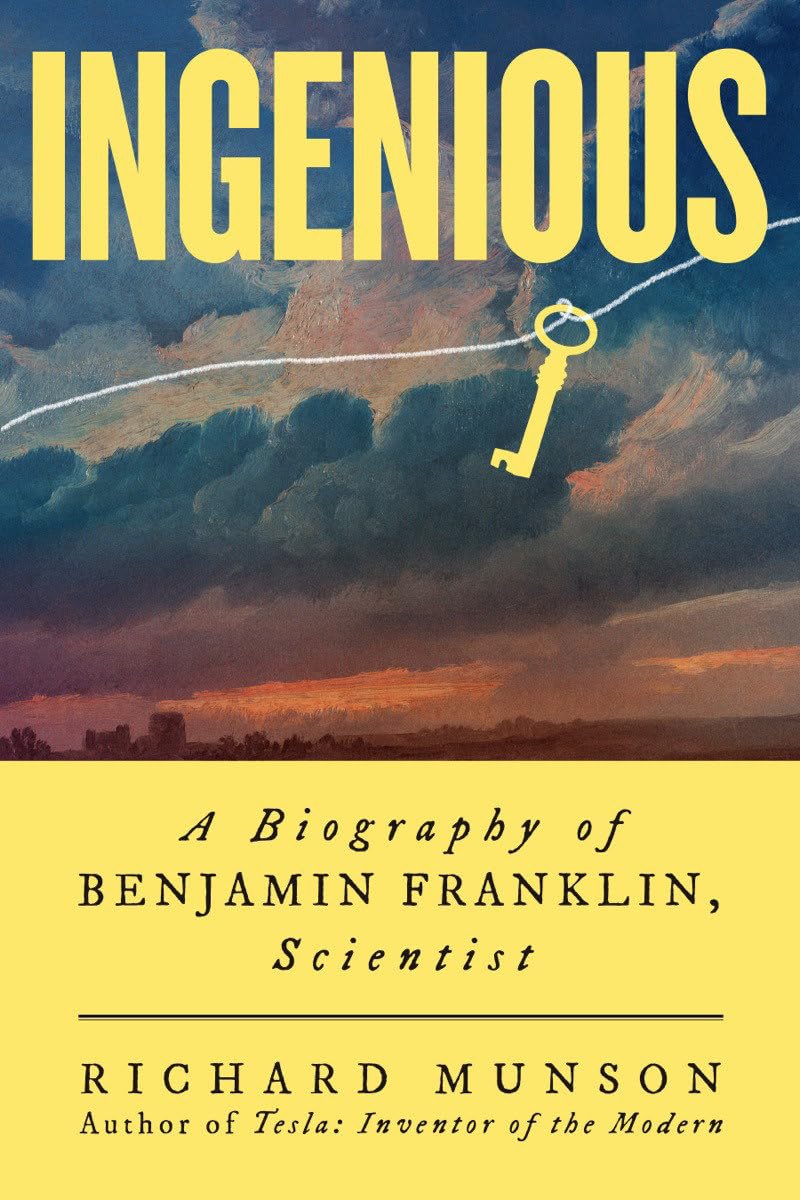Book I’m Reading

I picked this one up from the library last week and it is engaging. It’s paced well, starting out with the classic recounting of the key-on-a-kite experiment that proved the connection between lightning and electricity.
From the Goodreads summary:
In Ingenious, Richard Munson recovers this vital part of Franklin’s story, reveals his modern relevance, and offers a compelling portrait of a shrewd experimenter, clever innovator, and visionary physicist whose fame opened doors to negotiate French support and funding for American independence. Munson’s riveting narrative explores how science underpins Franklin’s entire story—from tradesman to inventor to nation-founder.
Video I’m Watching
Strategy’s Q1 Earnings Livestream:
Join our livestream for a discussion of Q1 financial results — including a review of $MSTR, $STRK, $STRF, and Convertible performance; a tutorial on our BTC metrics, models, and methods; and key @Strategy insights no investor should miss.https://t.co/0sDLmOLca9
— Michael Saylor (@saylor) May 1, 2025
On Bitcoin
Why Churches Should Consider Bitcoin: A Matter of Stewardship and Love
When we talk about loving people well, we rarely discuss the financial infrastructure that enables that love. Yet as inflation erodes our dollars, our ability to provide quality care diminishes. This isn’t just economic theory—it’s practical ministry.
Think about it: loving people costs money. Feeding people nutritious food costs more than processed alternatives. Quality childcare, youth programs, and community outreach all require sustainable funding. When our currency loses value year after year, our capacity to love through these ministries shrinks.
This is where Bitcoin offers a unique opportunity for churches. Unlike dollars, which can be created indefinitely, Bitcoin has a fixed supply that cannot be manipulated. When central authorities print more money without creating proportional value, everyone holding dollars loses purchasing power. Bitcoin stands apart from this system.
By converting even a portion of ministry reserves to Bitcoin, churches aren’t just making an investment—they’re preserving their ability to serve well over time. It’s about stewardship of resources entrusted to us for Kingdom work.
Consider this practical example: a church that placed just 5% of its savings in Bitcoin five years ago would have significantly increased its ability to fund ministry today. That’s not speculation—it’s mathematical reality resulting from sound money principles.
As inflation makes reaching the lost world with the gospel more expensive, Bitcoin’s appreciation would help offset these rising costs.
You might worry this sounds like worldly financial thinking, but remember the parable of the talents. The master commended those who stewarded resources wisely! We’re called to be “as shrewd as serpents and as innocent as doves” (Matthew 10:16).
Early adoption of Bitcoin by churches isn’t about chasing wealth—it’s about preserving purchasing power to maintain and expand ministry effectiveness. It’s protecting resources against the erosion that makes loving people well increasingly difficult.
Imagine a church that, instead of constantly fighting budget constraints from inflation, finds itself with expanding resources to serve its community, support missionaries, and care for the vulnerable.
This isn’t about getting rich—it’s about resisting a system that consistently devalues the resources we use to love others. It’s about ensuring that in 5, 10, or 20 years, our churches can continue effectively extending the gospel to a world that needs to hear it.
Bitcoin offers churches a way to recapitalize ministry on the hardest money ever created. The question isn’t whether we can afford to explore this opportunity—it’s whether we can afford not to.
What could your church do with resources that appreciate rather than depreciate? How might that transform your ability to accomplish the Great Commission for generations to come?
Tweets I’m Reading
"China", "tariffs", my business. I spent $1,000,000 over the past 14 years developing a factory in China. I married Chinese. I lived in China for seven years, and live there for three months in the summer. Tried to move the factory in 2021 to the US, impossible. Very bad.… pic.twitter.com/sBwPo515CR
— Erik Kaiser (@ErikKaiser) April 29, 2025
I think there is a strong argument to be made that even if you hold the opinion that bitcoin is for financial transactions, not arbitrary data storage, the figurative horse has bolted and efforts to close the stable door are currently futile. The argument looks like this.
— orangesurf (@OrangeSurfBTC) April 30, 2025
1)…
If your feedback isn’t sticking, your problem isn’t feedback.
— Dave Kline (@dklineii) May 1, 2025
It’s unclear expectations.
Here’s how to approach this issue:
1. Co-author, don't dictate
I have my team draft their own expectations, then we refine together. Autonomy ensures ownership. Directions get discarded.…
Babies and dead people getting federal loans. Taxpayer dollars to hold parties in Caesars Palace.
— Charlie Kirk (@charliekirk11) May 2, 2025
Jesse Waters just did an excellent deep dive into the real inner workings of DOGE. It shows a dedicated team of incredibly smart, driven, patriotic Americans trying to fix a looting… pic.twitter.com/0huozK3bx4
1/ A thread for those serious about understanding real BTC exposure🧵
— Jeff Park (@dgt10011) May 2, 2025
🚨 Why “BTC per Share” is a nuanced metric
⚠️ How “Bitcoin Yield” could be misunderstood
🔥 And how to evaluate BTC-exposed stocks like $MSTR and $SMLR using a new metric→ Volatility Per BTC Share (“VPBS”)
If you have feedback for me, if something resonates and you want to see more of it, reply in the comments below. You can also tweet at me on Twitter @the_cody_hall.
I look forward to hearing from you!
If you’re not yet subscribed you can do so here: